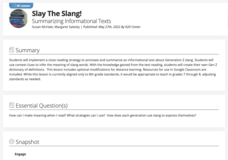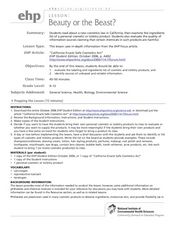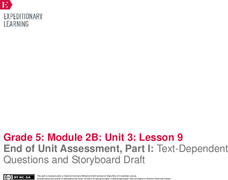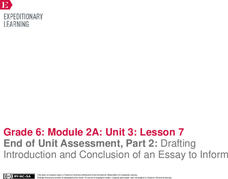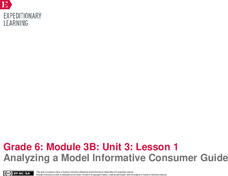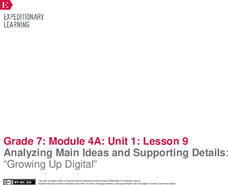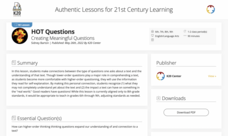Curated OER
Comprehension: Compare and Contrast Topics in Two Texts
A scripted lesson can be a big help for new teachers. This fully scripted three-day learning activity provides teachers with the means to demonstrate how to compare and contrast two topics in two texts. Learners will work as a class to...
EngageNY
Reading for Gist and Answering Text-Dependent Questions: Local Sustainable Food Chain
Readers use sticky notes and a Reading Closely: Guiding Questions handout to record the gist of a different section (pages 161-166) in The Omnivore’s Dilemma. They then pair up and share their ideas. To end the lesson, readers complete...
EngageNY
Organizing an Opinion, Reasons, and Evidence: Text 2 for Each Expert Group
The proof is in the reading. Using the informative resource, scholars read a second article about either Althea Gibson or Roberto Clemente. As they read, they continue adding reasons and evidence to their graphic organizers to show how...
EngageNY
Mid-Unit 3 Assessment Part 1: Researching Information about Buying Fish Caught Using Sustainable Methods
Sustainable seafood is not an oxymoron. Pupils watch a video about how consumers purchase seafood responsibly. Then, using resources in their assessment research folders, they complete a graphic organizer to record factual information...
EngageNY
End of Unit Assessment: Drafting the Informative Consumer Guide
Not all sandwiches are edible. Scholars use a Quote Sandwich graphic organizer to draft the written content of their informative consumer guides. Additionally, they view a mini-lesson on formal writing.
K20 LEARN
Slay the Slang! Summarizing Informational Texts
Middle schoolers get hip to the jive with a lesson about slang. They closely examine examples of slang and use context clues to infer the meaning of the terms. Groups read and summarize an article about a teacher who created a Gen Z...
Curated OER
Can Scientists Discover a Limit to Discovery?
Is there anything left to discover? Evaluate opposing sides of the debate regarding whether or not there is a future for scientific discovery. Middle and high schoolers assess quotations from the articles included to evaluate claims and...
Curated OER
Beauty or the Beast
Does the FDA really intend to protect public health? Spark a debate in your chemistry or health class by using this article, titled "Beauty or the Beast." It questions the safety of cosmetics and toiletry products, govenment regulations,...
K20 LEARN
Bear Tale: Author's Purpose - Informing Or Entertaining
After reading The Mitten by Jan Brett, scholars discuss the author's purpose. Small groups compare and contrast a book written to entertain and a book to inform, then create a T-Chart detailing the characteristics of each. Learners...
California Education Partners
Quest for Tree Kangaroo
A three-day assessment challenges scholars to read a passage from an informational text then complete two activities that lead to a writing assignment. Day one and two begin as readers independently read a passage and tag the most...
EngageNY
End of Unit Assessment, Part 1: Text-Dependent Questions and Storyboard Draft: “You Can Do a Graphic Novel” Excerpt
Eyes on the finish line. Serving as the first part of the end of unit assessment, learners answer questions based on a text about how to write a graphic novel. Using what they've learned, they then create a storyboard about the invention...
California Education Partners
We Are The Ship
An assessment sheds light on scholars' ability to read, gather evidence, and draft an original written composition. Learners read an informative text twice before taking notes and discussing their thoughts and textual evidence with a...
EngageNY
Main Ideas in Informational Text: Analyzing a Firsthand Human Rights Account
Although this is part of a series, lesson plan nine has your class take a break from their close study of the Universal Declaration of Human Rights (UDHR) text to read the firsthand account “Teaching Nepalis to Read, Plant, and Vote” by...
EngageNY
Main Ideas in Informational Text: Analyzing a Firsthand Human Rights Account for Connections to Specific Articles of the UDHR
Lesson 10 in a series of human rights lessons focuses on the skills of finding evidence and summarizing. Your young readers work to compare the two texts they have read in this unit: the Universal Declaration of Human Rights...
Curated OER
Thrilling Information: Music and Reading
Here’s a cross-curricular program music activity that uses Peer Gynt to engage class members. Groups take one section of “In the Hall of the Mountain King,” choreograph their section of the tune to represent the story as they imagine it,...
EngageNY
End of Unit Assessment, Part 2: Drafting Introduction and Conclusion of an Essay to Inform
A powerful introduction and conclusion can really pack a punch. Using the resource, scholars first read and discuss a model essay. Then, as part of the end of unit assessment, they draft the introductory and concluding paragraphs of...
Utah Education Network (UEN)
Evaluating the Format of Informational Text
Make your learners aware of the advantages and disadvantages of using different media in presentations. This straightforward resource evaluates media formations such as print, digital text, and videos. Although the subject of ballet is...
EngageNY
Analyzing a Model Informative Consumer Guide
What do consumers need to know about overfishing before buying fish? Scholars consider the question as they prepare for their performance task, which is to create a consumer guide for people about purchasing fish responsibly. After...
EngageNY
Reading Maps: Locating the Countries We Have Been Reading About
Show your class how to read a map and decipher all of the markings and features. Start out by connecting maps to their homework from the night before and their current reading, in this case That Book Woman, and a related informational...
EngageNY
Reading about Freaky Frogs: “The Glass Frog”
Freaky frogs are the focus of a lesson plan designed to boost reading comprehension skills using text features and asking and answering questions. Informational text and a poem supply scholars with animal-related vocabulary and facts. A...
ReadWriteThink
What is Poetry? Contrasting Poetry and Prose
Introduce middle schoolers to the different strategies used when reading prose versus poetry. Groups use a Venn diagram and a poetry analysis handout to compare the characteristics of an informational text and a poem on the same subject...
Texas Commission on Environmental Quality
Environmental Sciences
Whether you are teaching environmental science in junior high or studying recycling in kindergarten, there is something for all in this set of lessons designed for environmental education. The 110-page packet comes with tips for teaching...
EngageNY
Analyzing Main Ideas and Supporting Details: “Growing Up Digital”
Young scholars continue their exploration of adolescent brain development by reading an informational text, "Growing Up Digital," by Matt Richtel. Then, with partners, they complete note-catcher worksheets to capture the article's main...
K20 LEARN
HOT Questions: Creating Meaningful Questions
Scholars examine a list of questions and sort them into corresponding groups based on similarities. A gallery walk allows peers to see how their peers sorted questions and leave notes. Costa's Level of Questions is the topic of a...







